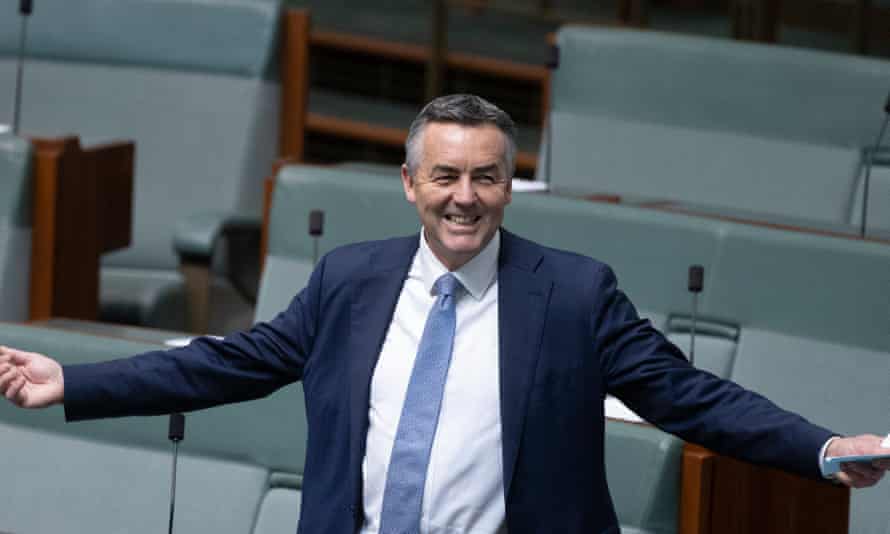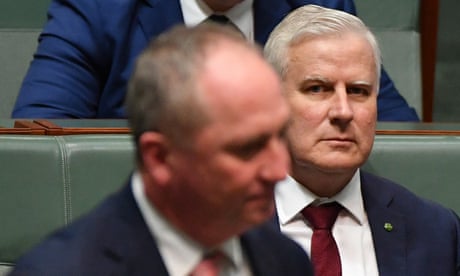Extract from The Guardian
Former Coalition frontbencher says it would be madness to rule out a conversation when there could be opportunities for regional Australia.

Last modified on Thu 23 Sep 2021 03.32 AEST
The former federal frontbencher Darren Chester has declared the National party needs to have a “credible policy” on emissions reduction and sustainability which includes an aspirational target of net zero by 2050.
Chester’s intervention, which follows public positioning by metropolitan Liberals this week, comes ahead of a speech the treasurer, Josh Frydenberg, will make to business leaders on Friday highlighting changing dynamics in global capital markets and problems associated with carbon risk.
Chester was dumped from the ministry by Barnaby Joyce when he returned to the Nationals leadership in June. The Victorian National told Guardian Australia he supported the commitment by the National Farmers Federation to an economy-wide target of net carbon zero by 2050.
He characterised the NFF’s position as “eminently sensible”.

“For us to succeed as a party in the future, we need a credible policy on emissions reduction and broader environmental issues to engage with younger voters,” Chester told Guardian Australia.
He added it would be “madness for regional communities and the agricultural sector to rule itself out of a [net zero] conversation prematurely when there could be opportunities for increasing sustainability by being part of the solution”.
With business groups leading calls for the government to adopt a net zero target, Guardian Australia understands Frydenberg will address the coming transition through an economic lens at a session convened by the Ai Group.
The interventions come as the Morrison government mulls its position ahead of the Cop26 summit in Glasgow. The former deputy prime minister Michael McCormack warned this week that a flat “no” to net zero could threaten Australia’s trade relationships and export income.
After Joyce returned to the Nationals leadership, he signalled initially that his party would be unlikely to sign on to a net zero commitment ahead of Glasgow.
But the deputy prime minister subsequently softened his position after several colleagues told him that decision was one for the Nationals party room – not a captain’s call. Some of Joyce’s strongest internal supporters oppose a net zero commitment.
The prime minister, Scott Morrison, has also faced questions from the US president, Joe Biden, about Australia’s climate policy during their first bilateral meeting in New York.
Biden had used a speech to the UN general assembly earlier on Tuesday to urge “every nation” to “bring their highest-possible ambitions to the table when we meet in Glasgow” for the climate summit in November and to “keep raising our collective ambition over time”.
Morrison, who insists Australia and the US are on the same page about climate policy, also met the British prime minister, Boris Johnson, in Washington after his conversation with Biden. Johnson is in the US to lobby other leaders to increase ambition ahead of the Glasgow summit.
The Australian government is expected to announce its climate strategy next month. Metropolitan Liberals are pushing for the net zero target to be adopted, but the Nationals will be crucial to any agreement.
Senior government players privately express confidence Morrison will be able to land a positive statement about net zero ahead of Glasgow – although not everyone is certain about that landing point.
As well as the pressure to declare a mid-century target, Australia is also being lobbied to unveil more ambitious medium-term targets.
A senior US climate official told the Guardian last month that Australia’s 2030 target of reducing emissions by 26-28% on 2005 levels was “not sufficient”. Metropolitan Liberal MPs are also agitating for increased ambition in the medium term, with the Wentworth MP, Dave Sharma, proposing a 2035 target of 40-45%.

But the current expectation is the government will try to deflect that pressure by highlighting a projected overachievement on the current commitment of a 26 to 28% cut on 2005 levels by 2030.
Australia’s trade minister, Dan Tehan, told the National Press Club on Wednesday the government was still thrashing out its plan “to get as close to net zero by 2050 as we possibly can”.
Tehan said he thought Australia would “play an absolutely key role as we head towards trying to get to that 2050 zero emissions target and trying to help the rest of the world and key countries in our region reach those goals as well”.
Tehan was non-committal when asked about McCormack’s views, and the push by metropolitan Liberals including Sharma for Australia to pledge stronger interim targets. Tehan’s electorate is in regional Victoria.
“Well, obviously Australia has a very clear position at the moment and that is that we’re aiming to get as close to net zero by 2050 as we possibly can and we continue to work through that,” the trade minister said, before stressing the government’s emphasis on low-emissions technologies such as hydrogen.
“One of the things that as trade minister that I am ultimately seeking to do is to make sure we can put in place the partnerships with other countries, to not only make sure that we can get as near as possible to meeting our commitments, but that they can as well.”
No comments:
Post a Comment